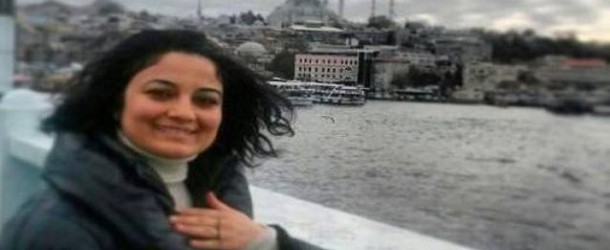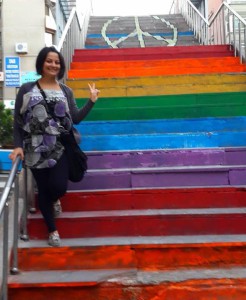Taken from El Internacionalista.com
1. Thank you for accepting this interview. Could you tell us a little about your life, your studies and your stay in Mexico?
Ayşe Yarar: You are welcome, it is a pleasure for me. I graduated from the department of International Relations at Hacettepe University, in Ankara, Turkey in 2007. I have been studying History of Turkish Republic since 2007. I took master degree from Suleyman Demirel University in Isparta, Turkey in 2010. I am PhD student now and have been working as a research assistant for 4 years at Social Sciences Institute of Suleyman Demirel University. My PhD topic is “A Comparative Analysis of Single Party Systems: Turkish and Mexican Cases“. I am interested in Iberian Colonialism, Latin American Studies and Comparative Studies, especially comparisons of political experiences of Latin American countries with Turkey.
2. What are the fundamental principles that remain in Turkey despite government changes?
Ayşe Yarar: The first three article of Turkish Constitution are the fundamental principles that cannot be changed in any governmental changes. These articles are in the constitution under the title of General Principles. The first article is that The State of Turkey is a Republic. The second article is about characteristics of the Republic: The Republic of Turkey is a democratic, secular and social state governed by rule of law, within the notions of public peace, national solidarity and justice, respecting human rights, loyal to the nationalism of Atatürk, and based on the fundamental tenets set forth in the preamble. The third article is thatThe State of Turkey, with its territory and nation, is an indivisible entity. Its language is Turkish. Its flag, the form of which is prescribed by the relevant law, is composed of a white crescent and star on a red background. Its national anthem is the “Independence March”. Its capital is Ankara. These three articles are guaranteed with the fourth article of the constitution: The provision of Article 1 regarding the form of the State being a Republic, the characteristics of the Republic in Article 2, and the provisions of Article 3 shall not be amended, nor shall their amendment be proposed.
3. What is the vision in your country in relation to nuclear power since Turkey’s geographical position is strategic?
Ayşe Yarar: Turkey has made plans to establish nuclear power plants since 1970. But still there is no nuclear power plant in Turkey. Turkey needs to be a nuclear power because of its energy dependency on imported oil and gas. Turkey imports nearly all of its oil and gas. So, being nuclear power is important for the country’s economic growth and also elimination dependency to Russian and Iranian gas for electricity. On the other hand, population of Turkey is inreasing every year. It means that energy supply increases every year. For that reason Turkey has to improve energy efficiency and provide energy security.
4. How people perceive Erdogan position regarding the Syrian confrontation?
Ayşe Yarar: People in Turkey who support Erdogan perceive that Erdogan was on the right way while he was encouraging war against Assad regime. According to this view, Assad was oppressing Syrian people as a dictator or as a tyrant. Also they seem to believe that Erdogan is the leader of Middle East, and also according to me Erdogan’s own perception is the same. He wants to make Turkey as the main regional power in the Middle East. Also whenever Erdogan criticized Assad regime, he always has reminded Ottoman past of Syria and Syrian Muslim population. According to him, because of historical ties, Turkey had to intervene Syrian politics to end “Assad persecution”. This kind of approach of Erdogan is interpreted that he was trying to use historical background to dominate the countries in the Middle East. Additionally other people in Turkey who were against Erdogan’s position regarding with the Syrian issue made anti-war demonstrations.
5. What is the relationship between the press and government especially after what happened in Gezi Park?
Ayşe Yarar: The situation of press is bad enough in Turkey. Because it is under the pressure of ruling party. The journalists who criticized Erdogan’s actions are in prison now. Also some other journalists were dismissed because of their writings against Erdogan’s policies, and also the same could be happen to the rest of opposing journalists. Unfortunately, culture of submissiveness to the authority is permanent in the major part of the society. In the same way, authority generally expects from its citizens to obey itself. Gezi Park protests had an extraordinary importance for the country’s agenda. Even so, the most watched TV channels didn’t give the news about the events during the Gezi Park protests. Only two TV channels televised all the events. People generally could learn the news or follow the events from social media or foreign TV channels. Even the newspapers except a few ones avoided to show all the details related to protests in Taksim. It is clear that the government doesn’t like any opposing news and doesn’t want to accept or endure existence of effective opposing groups. On the other hand, Erdogan and his government always tell about advanced democracy in Turkey. It is a big contradiction.
6. In your opinion, how do you think that the Turkish government should have acted on the protests in the Gezi Park?
Ayşe Yarar: If the government didn’t let brutal police violence and using tear gas or any gas bomb against protesters and could look for the rapprochement way, then the protests would not increase. People were demanding to have some more democratic rights for their liberties or removal of limitations on their rights and preservation of green spaces there. But the government didn’t prefer to make a deal with the protesters.
7. How do you perceive the presence of young Turkish people in politics today?
Ayşe Yarar: It is important for democratization of Turkey. Young people should be aware of what is happening in Turkey also in the world.
8. What is your opinión about the Turkish democracy package regarding political and social rights of the Kurdish minority?
Ayşe Yarar: I don’t accept this package as democratic. Firstly, this package didn’t meet the demands and expectations of the people who were waiting for more democracy and liberty. Not only Kurdish people but also people from the other ethnic origins in Turkey didn’t obtain any guarantees of their life styles and choices. The package provided women to use head scarf in public spaces but on the other hand, it didn’t enlarge liberties for non-conservative women. For example, one of the deputy chairmen of AK Party criticized a woman who was working on a TV channel because of her decollete dress. Then she was dismissed from the channel. Also Erdogan made a speech a few days ago about the university students accomodation housing. This is the quotation of his speech: “Students, boys and girls, are living together in the same homes because the dorms are insufficient. This is incompatible with our conservative democrat nature. I’ve seen this in Denizli. I’ve instructed the governor. Whatever is necessary will be done. It’s not clear what is going on in these places. They are all mixed up, anything can happen. As a conservative democratic government, we have to intervene. In these places, there is intelligence received by our security forces, the police department and the governorates. Acting upon this intelligence, our governors are intervening in these situations.” To Erdoğan, such actions are part of the government’s responsibility. A boy and a girl who are older than 18 years, can not share the same flat or house. This is an intervention to private lifes of adults who are Kurdish, Turkish or other ethnicities. So it is clear that Erdogan’s package was made for his followers to provide the guarantee of the votes of conservative muslim people. While his authoritarian style of leadership is going on, it is impossible to tell about a democratic package for any people or any person. Democracy in a country should cover all the citizens, not only one ethnic group or one ideological group. Democracy is for everyone. This package had to solve all kinds of problems related to fundamental rights and freedoms in the country. But if we evaulate the package just for the fundamental rights and freedoms of Kurdish people, then it failed again. Because political representatives of Kurdish people told that the package was insufficient. So according to me, Erdogan presented some limited rights to conservative and Kurdish people under the name of democracy package as an investment instrument for the next elections.
9. What is the perception of Turkey in relation to Latin America, specifically to Mexico in economic, social and development terms?
Ayşe Yarar: Latin America isn’t known well in Turkey. There are some reasons for this situation. Because of geographical distance, lack of historical, political and economic relations between Turkey and Latin American countries, people didn’t pay too much attention to the developments in the region. Latin America was only known with its political figures like Fidel Castro, Che Guevara, more currently Hugo Chavez. But in recent years, this situation has been changing. Economic cooperations with Latin American countries and also academic studies about the region are increasing. So people need to learn more about Latin American history and politics. Academics are using archival documents to show the beginning of relations between Turkey and Latin America. There are books and articles about the relations of Ottoman Empire and Latin American countries. More knowledge is providing to understand the similarities in terms of the problems of democratization process in Turkey and Latin American countries.
Mexico is best known with its rich variety of cuisine, beautiful beaches and places, Frida Kahlo, Diego Rivera, Pancho Villa, Emiliano Zapata, drug trafficking, border with the USA, and also warm and friendly people. So this country has always attracted many people’s attention in Turkey. But also many people avoid to go to Mexico; they are thinking that Mexico is a dangerous country to travel.
10. In your opinion, what do you think that is what unites and what separates Turkey from Mexico? How these countries could improve their relations?
Ayşe Yarar: There are many similarities and also differences between these countries. Geographic locations of both countries have affected their historical development process. They are on transit ways. While Turkey is providing connection between East and West, Mexico unites North and South. This geostrategic locations have had political and economic effects on these countries. Both countries experienced national revolutions, single party regimes, reformation process and political modernization under authorian party leaders. These are some of the similarities. But Turkey never experienced colonial governance in its history. Most of the population is Muslim in Turkey but Mexican people are generally Catholic. Religion affected both the countries’ secularizations. On the other hand, while Mexico became succesful to separate the military from the politics during the early times of new regime, Turkey couldn’t experience the same success for a long time. There are many other topics to discuss similarities and differences but these are enough to summarize, I think. Both countries should establish academic links between universities to provide student exchange or faculty member exchange for cultural relations. Students at Master or PhD level should be encouraged to study history, politics or economics of Turkey in Mexico or vice versa. Also scholarship programmes should be arranged for graduate and PhD students to send them to the related countries. This kind of policies of both countries can improve cultural relations.
Source: http://elinternacionalista.com/2013/12/12/vision-de-una-estudiante-turca/#!prettyPhoto/0/


























































